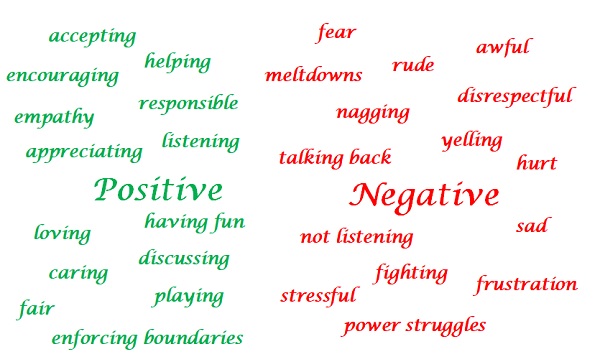Improving Family Relationships By Positively Shifting Your Energy
by Kathy Slattengren, M. Ed., Priceless Parenting (sign up for monthly parenting newsletter and receive 20+ printable charts for kids and parents)
(listen to article read by the author)

How do you feel about your relationship with each of your children? Are you feeling warmly connected, coolly distant or somewhere in between?
Relationships are dynamic. They change over time as both you and your children grow and change. These gradual changes can be hard to notice until one day you realize you are not happy with the way you and your kids are relating.
Signs of Struggling in Your Relationship with Your Kids
It might be that you are
feeling overwhelmed and underappreciated. Or perhaps you feel the only way you can
get your kids to listen to you is if you yell.
Maintaining warm, loving relationships with your children is not easy. If you are struggling, you are not alone. Below are answers parents gave on a
Priceless Parenting quiz for their biggest parenting challenge:
- “I think I’m mean and angry most of the time. I check out. I feel I’m not as close to her as I want to be.”
- “Yelling, disrespect, nagging, talking back, power struggles, not listening”
- “Constant fighting between the kids and us.”
- “Yelling at my kids instead of talking to them and taking everything out on them.”
- “Yelling and getting upset because she always fights me and will not listen.”
- “Frustration with him not listening and totally blowing off my punishments. And the meltdowns he throws while in public and at home make me embarrassed and I usually cry when we get home.”
- “How I respond to the disrespect and feeling personally attacked”
- “When he straight up doesn't do what I ask or just completely ignores me.”
- “No matter what I do or say, my child over reacts and makes me the bad guy.”
- “My 10-year-old daughter has to be in charge or she is not happy.”
- “My biggest struggle is getting my kids to listen to me and respect me without thinking I’m he most horrible mom in the world when I asked them to do something.”
There is a lot of pain in these statements. A home filled with tension and yelling is not the way anyone wants to live. How can this negative energy be turned around?
Beginning with Self-care
Begin with the relationship you have with yourself. Acknowledge the hard work you are putting into parenting. Your kids are not likely to express their gratitude for all you do for them. At least not yet … perhaps when they are parents themselves!
In the meantime, you can be grateful to yourself for all you do. Every day treat yourself to some self-care that nourishes you. It might be going for a walk, reading a book, taking a hot bath, meditating or talking to a friend. Taking good care of yourself is a prerequisite for being able to take good care of your children.
Do you have a negative voice in your head that reminds you of your mistakes or weaknesses? Choose to stop beating yourself up. Instead talk to yourself like you’d talk to a good friend going through a similar situation. Show yourself the same love and compassion you’d show your friend.
Positively Building Your Relationships With Your Kids
Is part of your parenting stress due to taking on things that are not your responsibility? It’s not your job to keep your kids happy. It’s also not your job to control their behavior. You can only control your own behavior so focus on that.
For one week try changing your behavior. Notice things your children are doing well and let them know. Aim for at least five
positive interactions for every negative one. You might say “Thank you for taking your shoes off at the door and helping keep the house clean.”
This week stop yourself from yelling. When you feel angry, this tells you a boundary has been crossed. Instead of yelling, try to
respectfully enforce the boundary. For example, if your kids forget to take off their shoes and track in dirt, ask them to wipe off the floor. If they’ve left a mess in the kitchen so it’s hard for you to cook dinner, let them know that you’ll be happy to start making dinner when the mess is cleaned up.
Next take time to think about what you love about your children. You might want to write down the things you love about them so they can reread it whenever they want. Find a time this week to share with them the things you most appreciate about them.
Finally plan some fun activities to do with your kids. Doing something fun together positively builds your relationship. The better your connection to your children, the more likely they are to be cooperative.
After this week is done, notice how you feel. Has the energy in your family shifted? Are you feeling different about yourself or your kids? The time and effort you put into more positive interactions will change your family dynamics. Experiencing more joy and less stress is worth it!